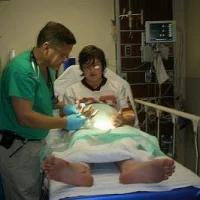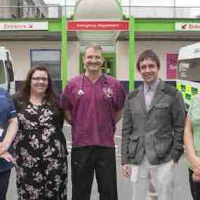A multicentre study by Swiss and Spanish researchers has found that a new strategy to rule out and rule in heart attacks in emergency departments will help physicians treat patients faster. The new technique, called high-sensitivity cardiac troponin T 1-hour algorithm, was previously tested in a small pilot study.
The research team decided to conduct a clinical trial to assess the new technique's effectiveness in determining whether a patient has had a heart attack. They enrolled 1,320 patients who visited the emergency department with suspected acute myocardial infarction (MI) and applied the high-sensitivity cardiac troponin T 1-hour algorithm to blood samples.
Acute MI is a common cause of death and disability around the world. Early diagnosis of the condition is critical for treatment and survival. Cardiac troponins (T and I) are currently the gold standard for definitive acute MI diagnosis due to their high sensitivity and specificity for detection of myocardial cell injury. However, troponin is undetectable by current tests in peripheral blood within 3 to 4 hours after onset of chest pain in acute MI.
"Introducing the high-sensitivity cardiac troponin T 1-hour algorithm into clinical practice would represent a profound change and it is therefore important to determine if it works in a large patient group," explains the study's lead author Dr. Tobias Reichlin, Department of Cardiology and Cardiovascular Research Institute Basel, University Hospital Basel, Switzerland.
With the 1-hour algorithm, Dr. Reichlin and colleagues were able to determine that 786 (60 percent) of patients did not have an acute MI ("rule out"), 216 (16 percent) were "rule in" and 318 (24 percent) were to be observed because results were not conclusive.
"This rapid strategy incorporating high-sensitivity cardiac troponin T baseline values and absolute changes after the first hour substantially accelerates the management of patients with suspected acute MI by allowing safe rule-out as well as accurate rule-in of acute MI in 3 out of 4 patients," Dr. Reichlin's team concludes. The findings are reported in CMAJ (Canadian Medical Association Journal).
Source: Canadian Medical Association Journal
Image Credit: Google Images
The research team decided to conduct a clinical trial to assess the new technique's effectiveness in determining whether a patient has had a heart attack. They enrolled 1,320 patients who visited the emergency department with suspected acute myocardial infarction (MI) and applied the high-sensitivity cardiac troponin T 1-hour algorithm to blood samples.
Acute MI is a common cause of death and disability around the world. Early diagnosis of the condition is critical for treatment and survival. Cardiac troponins (T and I) are currently the gold standard for definitive acute MI diagnosis due to their high sensitivity and specificity for detection of myocardial cell injury. However, troponin is undetectable by current tests in peripheral blood within 3 to 4 hours after onset of chest pain in acute MI.
"Introducing the high-sensitivity cardiac troponin T 1-hour algorithm into clinical practice would represent a profound change and it is therefore important to determine if it works in a large patient group," explains the study's lead author Dr. Tobias Reichlin, Department of Cardiology and Cardiovascular Research Institute Basel, University Hospital Basel, Switzerland.
With the 1-hour algorithm, Dr. Reichlin and colleagues were able to determine that 786 (60 percent) of patients did not have an acute MI ("rule out"), 216 (16 percent) were "rule in" and 318 (24 percent) were to be observed because results were not conclusive.
"This rapid strategy incorporating high-sensitivity cardiac troponin T baseline values and absolute changes after the first hour substantially accelerates the management of patients with suspected acute MI by allowing safe rule-out as well as accurate rule-in of acute MI in 3 out of 4 patients," Dr. Reichlin's team concludes. The findings are reported in CMAJ (Canadian Medical Association Journal).
Source: Canadian Medical Association Journal
Image Credit: Google Images
References:
Reichlin T, Mueller C et al. (2015) Prospective validation of a 1-hour algorithm to rule-out and rule-in acute myocardial infarction using a high-sensitivity cardiac troponin T assay. CMAJ, April 2015 DOI:
10.1503/cmaj.141349
Latest Articles
ER, heart attack, algorithm, emergency department, acute myocardial infarction, troponin
A multicentre study by Swiss and Spanish researchers has found that a new strategy to rule out and rule in heart attacks in emergency departments will help...










